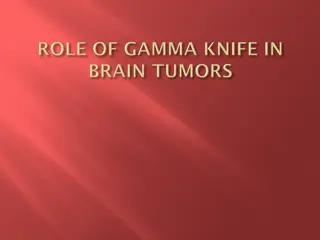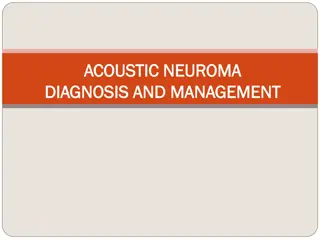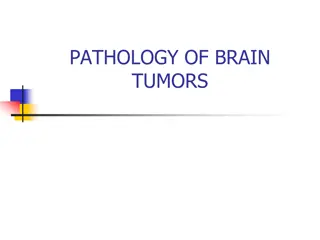
Brain Tumors: Types, Symptoms, Causes, and Treatment
Explore the world of brain tumors, from benign to malignant types, their symptoms, causes, and available treatments. Learn about different brain tumor classifications and how they can affect your health. Stay informed and empowered in the face of this complex medical condition.
Download Presentation

Please find below an Image/Link to download the presentation.
The content on the website is provided AS IS for your information and personal use only. It may not be sold, licensed, or shared on other websites without obtaining consent from the author. If you encounter any issues during the download, it is possible that the publisher has removed the file from their server.
You are allowed to download the files provided on this website for personal or commercial use, subject to the condition that they are used lawfully. All files are the property of their respective owners.
The content on the website is provided AS IS for your information and personal use only. It may not be sold, licensed, or shared on other websites without obtaining consent from the author.
E N D
Presentation Transcript
StudyMafia.Org Brain Tumor Submitted To: Submitted By: Studymafia.org Studymafia.org
Table Contents Definition Introduction Types of Brain Tumor Symptoms of Brain Tumor Causes of Brain Tumor Risk-Factors of Brain Tumor Diagnosis of Brain Tumor Treatment of Brain Tumor Conclusion 2
Definition A brain tumor is a mass or growth of abnormal cells in your brain. 3
Introduction Many different types of brain tumors exist. Some brain tumors are noncancerous (benign), and some brain tumors are cancerous (malignant). Brain tumors can begin in your brain (primary brain tumors), or cancer can begin in other parts of your body and spread to your brain as secondary (metastatic) brain tumors. 4
Types of Brain Tumor Acoustic neuroma Astrocytoma Brain metastases Choroid plexus carcinoma Craniopharyngioma Embryonal tumors Ependymoma Glioblastoma 5
Types of Brain Tumor Glioma Medulloblastoma Meningioma Oligodendroglioma Pediatric brain tumors Pineoblastoma Pituitary tumors 6
Causes of Brain Tumor Gliomas. These tumors begin in the brain or spinal cord and include astrocytomas, ependymomas, glioblastomas, oligoastrocytomas and oligodendrogliomas. Meningiomas. A meningioma is a tumor that arises from the membranes that surround your brain and spinal cord (meninges). Most meningiomas are noncancerous. 8
Causes of Brain Tumor Acoustic neuromas (schwannomas). These are benign tumors that develop on the nerves that control balance and hearing leading from your inner ear to your brain. Pituitary adenomas. These are tumors that develop in the pituitary gland at the base of the brain. These tumors can affect the pituitary hormones with effects throughout the body. 9
Causes of Brain Tumor Germ cell tumors. Germ cell tumors may develop during childhood where the testicles or ovaries will form. But sometimes germ cell tumors affect other parts of the body, such as the brain. Craniopharyngiomas. These rare tumors start near the brain's pituitary gland, which secretes hormones that control many body functions. 10
Risk factors of Brain Tumor Exposure to radiation. People who have been exposed to a type of radiation called ionizing radiation have an increased risk of brain tumor. Examples of ionizing radiation include radiation therapy used to treat cancer and radiation exposure caused by atomic bombs. 11
Risk factors of Brain Tumor Family history of brain tumors. A small portion of brain tumors occurs in people with a family history of brain tumors or a family history of genetic syndromes that increase the risk of brain tumors. 12
Diagnosis of Brain Tumor A neurological exam. A neurological exam may include, among other things, checking your vision, hearing, balance, coordination, strength and reflexes. Imaging tests. Magnetic resonance imaging (MRI) is commonly used to help diagnose brain tumors. Collecting and testing a sample of abnormal tissue (biopsy). A biopsy can be performed as part of an operation to remove the brain tumor, or a biopsy can be performed using a needle. 13
Treatment of Brain Tumor Surgery If the brain tumor is located in a place that makes it accessible for an operation, your surgeon will work to remove as much of the brain tumor as can be done safely. Radiation therapy Radiation therapy uses high-energy beams, such as X-rays or protons, to kill tumor cells. Radiation therapy can come from a machine outside your body (external beam radiation), or, very rarely, radiation can be placed inside your body close to your brain tumor (brachytherapy). 14
Treatment of Brain Tumor Radiosurgery Stereotactic radiosurgery is not a form of surgery in the traditional sense. Chemotherapy Chemotherapy uses drugs to kill tumor cells. Targeted drug therapy Targeted drug treatments focus on specific abnormalities present within cancer cells. 15
Conclusion A brain tumor is a mass or growth of abnormal cells in your brain. Many different types of brain tumors exist. Some brain tumors are noncancerous (benign), and some brain tumors are cancerous (malignant). 17
References Google.com Wikipedia.org Studymafia.org Slidespanda.com
Thanks To StudyMafia.org






















